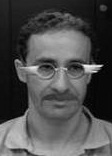Invited Talk by Prof. Pascal Fua

|
Prof. Pascal Fua
Computer Vision Group
EPFL, Switzerland
- Date: Thursday, 26 January 2012
- Time: 13:30
- Location: MI 01.13.010
|
Multi-People Tracking through Global Optimization
Abstract:
Given three or four synchronized videos taken at eye level and from different angles, we show that we can effectively detect and track people, even when the only available data comes from the binary output of a simple blob detector and the number of present individuals is a priori unknown.
We start from occupancy probability estimates in a top view and rely on a generative model to yield probability images to be compared with the actual input images. We then refine the estimates so that the probability images match the binary input images as well as possible. Finally, having performed this computation independently at each time step, we compute trajectories over tive by solving a convex constrained flow problem, which allows us accurately follow individuals across thousands of frames. Our algorithm yields metrically accurate trajectories for each one of them, in spite of very significant occlusions.
In short, we combine a mathematically well-founded generative model that works in each frame individually with a simple approach to global optimization. This yields excellent performance using very simple models that could be further improved.
Biography:
Prof. Pascal Fua has worked on various aspects of computer vision and augmented reality, including shape and motion recovery, human body modeling, real-time registration, and the use of information theory. He now heads the Computer Vision Laboratory.
Before joining EPFL in 1996, Prof. Pascal Fua worked at SRI International and at INRIA Sophia-Antipolis as a computer scientist. He is an Associate Editor of the IEEE Transactions on Pattern Analysis and Machine Intelligence and won the best paper award at CVPR 2005 and the best demonstration award at BMVC 2003.
The research activities of the Computer Vision Laboratory focus on shape and motion recovery from images, object and people detection and tracking in video sequences, and analysis of brain microscopy image-stacks. CVLab also provides undergraduate and graduate teaching and performs technology transfer to both established and start up companies.
Prof. Pascal Fua's research is sponsored by the Swiss National Science Foundation, the CTI, the European Union, and several industrial partners.


